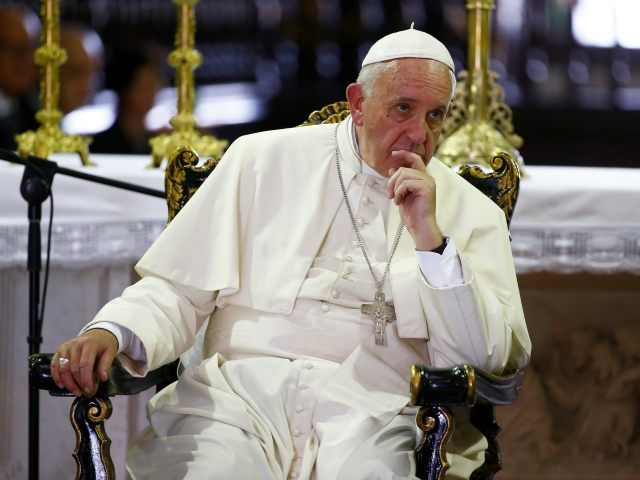Everyone knows that Pope Francis is capitalism’s number one critic, and he has been waiting for his U.S. visit to scold Americans on the economy, right? Not so fast. The fact is, that Francis has never been an enemy of capitalism and actually believes the free market is a good thing, as long as it has “limits.”
On Monday, CNN announced that, when he addresses Congress Thursday morning, Pope Francis will “probably discuss American capitalism’s flaws, a theme he has hit on since the 1990s.” Don’t bet on it, unless you have money to lose.
The Pope’s former teacher and one-time mentor, Father Juan Carlos Scannone, has declared that Francis is no anti-capitalist. “He doesn’t criticize market economics, but rather the fetishization of money and the free market,” Scannone said. “One thing is market economics. Another is the hegemony of capital over people.”
According to those who have known Bergoglio for years, although he always identified with the Church’s mission to the poor, the future pope never bought into Marxism or its Christianized counterpart, liberation theology.
Instead, Bergoglio embraced Father Scannone’s “theology of the people” (teología del pueblo) as an alternative to Marxist-inspired liberation theology. Far from the ideology of class struggle, the theology Francis adopted was more pastoral than ideological, emphasizing humility, simplicity, and intimate contact with society’s poor and most vulnerable.
If this is true, where did the myth of the Pope’s anti-capitalism come from?
In part, it came from Francis’s harsh rhetoric against the idolatry of money, but in part it was an invention of the media, repeated over and over until it became fact in the minds of hearers.
The Pope has inveighed against greed, consumerism, and an economic ideology that tramples human beings in the relentless pursuit of money. But then again, so did his predecessors. What he hasn’t done is suggest that the free market system should be tossed out and replaced with something else.
Strangely, people hear what they want to hear.
Some, like Michael Sean Winters, a journalist with the far left National Catholic Reporter, say there is no doubt about how the Pope feels about capitalism, that he is “absolutely” anti-capitalist. When you ask when Francis said this, however, there is no answer to be found.
In 2013, NBC’s Traci G. Lee wrote that “Pope Francis called rampant capitalism ‘a new tyranny’ in his first major document released as head of the Catholic church.” Amazingly, if you follow Lee’s own link, you come to a document where the word “capitalism” never even appears.
When the Pope visited three South American countries this past July, the Huffington Post proclaimed that he had condemned “unbridled capitalism” while the New York Times announced that the Pope had excoriated “global capitalism” in his speeches in Latin America. At the end of the day, however, the Pope said nothing of the sort.
Of course Francis said plenty of other things about the economy, but in the addresses referenced by the news outlets, the Pope never uttered the word “capitalism” at all, let alone unbridled or global capitalism. In fact, according to official documentation, the word “capitalism” never passed his lips during his entire Latin American trip.
The Pope’s famous line about “the devil’s dung” did not, indeed, refer to capitalism as a system, but to an “unfettered pursuit of money.” For Pope Francis, social woes always begin in the individual human heart, with unchecked vices that lead to evil behavior and sinful choices. These personal sins can then lead to unjust social structures and even corrupt institutions.
Francis’s predecessor, Pope John Paul II, famously distinguished between capitalism as an ideology of lawlessness and capitalism as a system that promotes free exchange and creativity.
“If by ‘capitalism’ is meant an economic system which recognizes the fundamental and positive role of business, the market, private property and the resulting responsibility for the means of production, as well as free human creativity in the economic sector, then the answer is certainly in the affirmative,” he wrote.
This is a summary of how Pope Francis thinks.
Apparently, Francis doesn’t like being put into a box. In his flight from Cuba to Washington DC on Tuesday, Pope Francis hastened to assure journalists that that he is not a “liberal.”
“Some people might say some things sounded slightly more left-ish, but that would be a mistake of interpretation,” he said before landing in the U.S. late Tuesday afternoon for his historic trip. “If you want me to recite the creed, I’m ready to do it.”
One of the Vatican’s best-kept secrets is that since becoming Pope in 2013, Francis has never uttered the word “capitalism” in a single public address. Not once.
The odds of the Pope criticizing American capitalism on Thursday? Bet all the money you have to lose.
Follow Thomas D. Williams on Twitter @tdwilliamsrome.

COMMENTS
Please let us know if you're having issues with commenting.